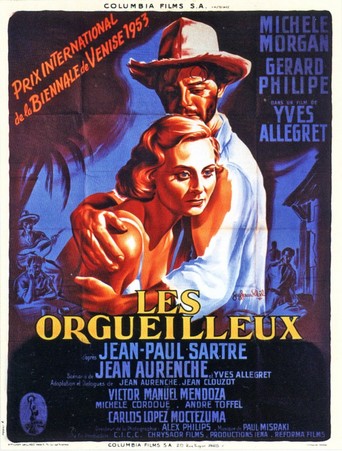Kirpianuscus
Story of a land more than story of characters. Admirable performance of Michelle Morgan. And sure, Gerard Philipe. You feel the heat and the poverty and the air. And, sure, the traits of love. A film like the picture of a world. And a love story as root of hope.
RogerTheMovieManiac88
'Les Orgueilleux' serves as my introduction to the movies of Yves Allegret. After viewing this, I definitely feel inclined to track down and watch more of his cinematic achievements.This is a startling and memorable movie to behold. Filmed in Mexico, it exhibits a level of hard-nosed realism that is striking. For me, the most outstanding aspect of this movie is the admirable creation of a strong atmosphere. Shifting from the Malaya that Sartre had originally envisioned to the remote Mexican Gulf Coast town of Alvarado, our troubled protagonists constantly drip in perspiration amid the torrid, stultifying turmoil of oppressive heat and a typhus epidemic. The cinematography of Alex Phillips vividly and imaginatively brings to life the heady and intoxicating atmosphere created. There is a wonderful framing of compositions with much happening invariably in the background. The camera that stops and observes while keeping track of proceedings wonderfully conveys the straining desperation and the edginess that pervades the town. The depiction of Easter celebrations adds to the swirling, unrelenting miasma. The sudden and intrusive clang of bells, the constant crackle of fireworks, and the wild beat of the huapango music contrives to put everybody on edge.The focus of Sartre's embryonic 1944 screenplay 'Typhus' is generally well reflected in this big screen treatment although the hopeful ending eventually led the pessimistic Sartre to distance himself from the finished film. Allegret and his team certainly give us rich and diverse characterisation of roles. Telerama hailed this as Michèle Morgan's best role of the 1950s, and they aren't far off, in my opinion. Halliwell's Film Guide roundly derides this movie as 'silly, poorly acted and unconvincing', which I think is a decidedly unfair judgement. Perhaps, they should re-evaluate it because I think Morgan absolutely shines as Nellie. She is warm, distantly sensuous and yet imposing as she surveys the surroundings in which she has been landed. The sense of numbness and isolation that she summons is perhaps particularly of note. The scene where she is alone with her dead husband exhibits great understanding of human emotion. Seemingly composed, she bends down to pick something up. Suddenly overcome by all that has happened, she starts heaving in tears in the darkened seclusion by the bedside. On a purely human level, Nellie's welling-up of emotions is realised in a very believable and gentle fashion by an actress of class and glacial beauty.Gerard Philipe utterly immerses himself in the frenetic blinding stupor of a disgraced man attempting to shut out his past. As Georges, he literally careens through the movie as a bearded drunkard on an unending bender. Philipe and Morgan are simply mesmerising and the absolute contrast in their characters proves compelling. They make the audience empathise with and feel for these trapped individuals every step of the way.This is a noteworthy movie featuring involving and interesting mood and characterisation. Allegret concocts a seething atmosphere inhabited by dislocated souls and succeeds in making the viewer care for them. An existential movie with a real edge, 'Les Orgueilleux' is an impressive accomplishment which offers a perceptive and uncompromising take on human nature.
writers_reign
There's much here to remind us of The African Queen (made around the same time) in the two leads, a drunk living in filthy rags and a classy, well-dressed woman who together do something worthwhile. This is a wonderful melange of older and newer talents; Jean Aurenche and Michele Morgan had both enjoyed success in the thirties - Aurenche co-wrote Carne's Hotel du Nord whilst Morgan co-starred in Carne's Quai des Brumes - whilst Philippe and Allegret enjoyed THEIR first successes in the forties, in fact they worked together on Une si jolie petite plage as well as scoring separately with such titles as Dedee d'Anvers and Le Diable au corps. Together they make a formidable quartet in a story about redemption into which it's possible to read a religious subtext if you're so inclined. This is French film-making at its best and I can only endorse other commenters who have bewailed the (thankfully short-lived) emergence of the New Wave later in the decade. One to cherish.
taylor9885
Allegret's most impressive location story, far better than the damp philosophizing of Une si jolie petite plage. I liked the approach: the characters are not symbols of alienation or corruption but have lives of their own. The meningitis outbreak in this Mexican town doesn't stand in for the moral decline of the West, unlike the plague in Puenzo's La peste, one of the worst films William Hurt ever made. I imagine that if Luis Bunuel had done this adaptation of a Sartre story, it would have looked a lot like Los olvidados, and the vomiting and sweating of the victims would have taken precedence over the moral self-questioning of the characters.Gerard Philipe is tremendous as the drunken ex-doctor with a terrible secret; he was able to forget that he'd become the official leading man of French cinema, star of the Cinema of Quality that Truffaut detested so much. Ditto for Michele Morgan, whose parts usually had aristocratic backgrounds, or at least great wealth. As the not-very-grieving widow of the first disease victim, she holds the picture together, making sure we don't get too swayed by Philipe's lowlife antics.


